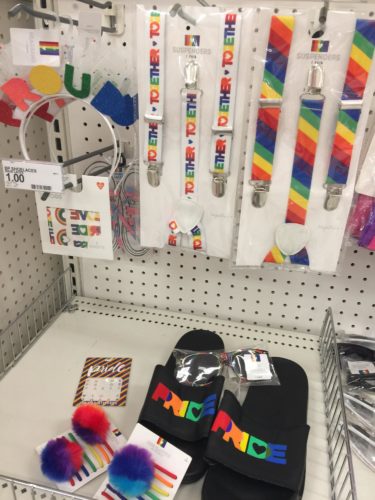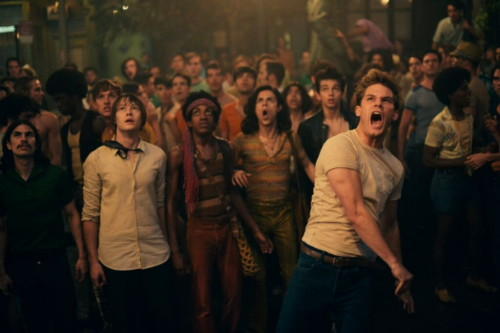Pagan Perspectives
June saw events around the world commemorating the LGBT+ Pride celebration. (LGBT+ refers to lesbian, gay, bisexual, and transgender, “plus” other nonheteronormative gender and sexual identities.) While on the surface these seem to be happy affairs, awash in rainbow colors and set to the thumping beat of dance music, their history is one marked by oppression and bloodshed.
Commemorating the June 1969 Stonewall Riots that sparked the birth of the LGBT+ equality movement, modern-day Pride celebrations have for years struggled against an onslaught of hatred and persecution in the United States and around the world. But as society continues to make its snail’s-pace march toward genuine equality, one unexpected – if problematic – ally has emerged: capitalism.
What began solely as a human rights movement has now also become a viable market. As members of the LGBT+ communities have garnered more legal rights and social status, we have also materialized as a profitable demographic. More and more companies have awakened to this fact as they seek access to the growing spending power this market possesses. Tailoring ads to target a particular people or community creates increased visibility for those people, which in turn creates greater opportunities for those people to collectively work toward shared socio-political goals. More visibility means greater overall acceptance. More acceptance means easier opportunities to sell products to a community, which leads to more products being created and marketed, leading to more visibility, ad infinitum.
In the 1990s, “freedom rings,” sets of small, rainbow-colored metallic rings, became the trendy way to make a statement of LGBT+ visibility. For only $10 or $20, one could wear their identity as part of their fashion. This opened up the market for additional products, and soon everything from keychains to stocking caps could be purchased, emblazoned with the now-iconic rainbow motif. 20 years ago, one would have needed to go to a “gay ghetto,” such as San Francisco’s Castro District, in order to purchase products specifically marketed to the LGBT+ community. Today, even mainstream retail outlets like Target stock such items as part of their marketing campaigns for seasonal merchandise, thus advertising to the world that – at least in terms of a symbolic message — they support equal rights.
Surely more visibility and more acceptance is a good thing, right? While I do believe that this is true in general, there is another side to consider. The blatant commercialism involved can sometimes be used to “pinkwash” a company’s track record in order to make it appear as if it is progressive, even when its history has been anything but. Another concern is when a company uses progressive policies toward LBGTQ+ people in an attempt to distract from other, unrelated issues upon which they would prefer to keep quiet, such as when BP launched an “LGBT Careers Event,” which was seen by some as an attempt to distract from the environmentally devasting Deepwater Horizon oil spill and the resulting damage to the company’s reputation.
Though we can point to how corporations might use LGBT+ movements as a vehicle for covering up their own bad behaviors, we have also seen how companies can make legitimate efforts to improve their public image by making actual progressive changes to their policies and how they relate to the LGBT+ community. One such example is Barilla, a pasta company based out of Italy, whose chairman Guido Barilla, in 2013, gave an interview to an Italian radio show in which he explained that the company would never make a commercial involving gay families. “If [gays] don’t like it,” he said, “they can go and eat another brand.”
The comments were deemed by many to be offensive, and in the span of just a year, fueled by a backlash from the LGBT+ community, Barilla turned its PR – and its policies – around, earning a top score in the 2015 Corporate Equality Index from the Human Rights Campaign.
Target likewise changed its tune, after having in 2010 supported a Minnesota gubernatorial candidate who opposed same-sex marriage, an act that sparked outrage and the threat of boycotts. Target soon made efforts to improve its public image, and in 2015 was hailed by the HRC for their efforts to promote progressive legislation. Today, Target, like Barilla, enjoys a top rating in the Corporate Equality Index.

A pride month display at an Atlanta area Target store [Heather Greene].
In the 2015 movie Stonewall, the events of that historic riot were retold in a way that largely erased the importance of key players who set events in motion. These players were Latina and black trans protesters like Marsha P. Johnson, Miss Major Griffin-Gracie, and Sylvia Rivera. Instead, the story focuses on a white cisgender gay man from Indiana, seen in the movie’s trailer throwing a brick. This scene purports to depict the beginning of the Stonewall riots. When the trailer was released, controversy broke out, as did a larger conversation about the erasure of trans people and people of color from queer history and spaces. In an opinion piece for the Daily Telegraph, Charlie Alderwick writes, “This is a character who has been specifically created to not be too queer, to appeal to the mass audience who have never faced these types of oppression.”
While we continue to make strides in gaining acceptance and equality, we must work to ensure that we are not erasing the most vulnerable among us. While conversations continue to take place in queer spaces about how trans and people of color might not be fully welcomed, the encouraging fact is that more and more people are in fact talking about it. White cisgender members of the LGBT+ community are receiving an education on how we might better understand the needs and experiences of those members who are trans and/or people of color.

Still from the 2015 movie, Stonewall [Phillipe Bosse].
What has happened is that a public relations campaign has been allowed to dictate opinions as facts to the masses, resulting in what amounts to a revisionist history. Our at times uncomfortable and inconvenient past catches up with us when we are forced to revisit topics such as the Burning Times, the hetero-exclusionary roots of Gardnerian Wicca, and, yes, whether or not some of us actually worship “the devil.” We are asked to listen to the experiences of those who are not the same as us. We cannot assume that our own experiences and knowledge are shared or even valued by everyone, even in our own communities. We are asked to expand beyond what we previously held to be “true.”
In the world of Neo-Paganism, this can mean revisiting old assumptions about mythology, magic, and even metaphysics, as we are exposed to other paradigms that do not stem from an exclusively heterosexual gender binary. While “the Goddess” and “the God” may have once been seen as universal archetypes that were inclusive, the modern emergent consciousness recognizes their inherent limitations. In the 21st century, we must once again rely on the dreamers, artists, poets, visionaries, and radicals in order to provide for us new paradigms to replace the old and the outdated. Like a snake shedding its skin, we must grow larger than what we were previously.
Where many practitioners of Witchcraft and Paganism today might consider themselves to be “leaning left” on the US political spectrum, many others would not. Even among those who do, there can be unconscious biases that continue to support systems of oppression against minority groups. This means we need to make sure that we not only make the commitment to listen to the voices of those who are different from ourselves, but also that we are committed to helping provide spaces in which those voices can safely be expressed, even when this means that it might make us uncomfortable. As both the LGBT+ and modern Pagan movements continue reaching out to educate the public, let us make sure that we do not sacrifice the very things that make us unique, nor deny our factual histories.
The Wild Hunt is not responsible for links to external content.
To join a conversation on this post:
Visit our The Wild Hunt subreddit! Point your favorite browser to https://www.reddit.com/r/The_Wild_Hunt_News/, then click “JOIN”. Make sure to click the bell, too, to be notified of new articles posted to our subreddit.
Pingback: Linkage: Freedom, politics, and eggshells | Spiral Nature Magazine